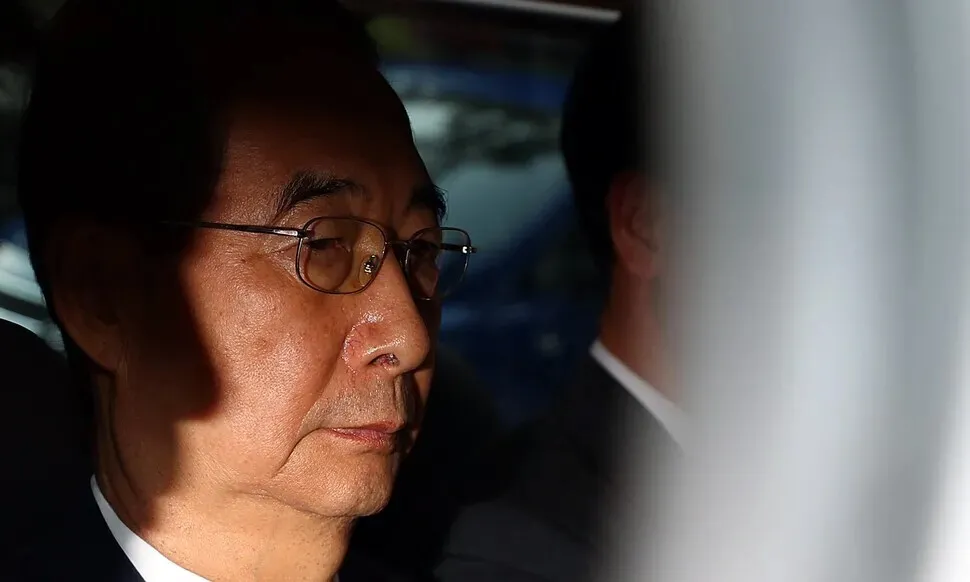hankyoreh
Links to other country sites 다른 나라 사이트 링크
Court denies arrest warrant for ex-PM accused of aiding insurrection

A court on Wednesday denied a warrant to prosecutors seeking the arrest of former Prime Minister Han Duck-soo over his alleged role in abetting former President Yoon Suk-yeol’s abortive martial law declaration on Dec. 3, 2024.
The court’s decision is expected to be a setback for the ongoing investigation into accomplices in what investigators view as an insurrection.
Judge Jeong Jae-uk, a senior warrant judge at the Seoul Central District Court, said Wednesday that there was “room for dispute” regarding key facts and the legal assessment of Han’s actions.
“Given how there is such room for dispute regarding the charges, the evidence collected, the progress of the investigation and the suspect’s position in society, it is difficult to conclude that the risk of him destroying evidence supersedes his right to due process,” the judge stated as he rejected the warrant request.
Han, who had been awaiting the ruling at the Seoul Detention Center in Uiwang, Gyeonggi Province, after appearing before the judge for a warrant request review, was immediately released.
The special counsel team, led by Cho Eun-seok, filed for a warrant Sunday to arrest Han on charges of abetting the ringleader of an insurrection, perjury, falsification of official documents and destroying public documents. Han is accused of proposing to Yoon that a Cabinet meeting be convened to confer procedural legitimacy to the martial law declaration and of attempting to conceal the procedural irregularities in the invocation by signing a retroactively drafted version of the martial law decree.
The special counsel team utilized a 160-slide presentation during the warrant validity review, which lasted for three hours starting at 1:30 pm on Wednesday, to clarify Han’s charges, emphasize the severity of the crime and highlight concerns about the destruction of evidence.
The team argued that Han, as the president’s top adviser and figure with the responsibility to keep the country’s leader in check, actively assisted Yoon in an insurrection attempt instead of preventing the illegal martial law declaration by proposing the Cabinet meeting to establish procedural legitimacy.
While Han claims that the Cabinet meeting was proposed to “oppose the declaration of martial law,” the fact that not all Cabinet members were summoned and that the meeting took place even when certain members had yet to reach the presidential office indicates that the meeting was convened to secure the declaration’s procedural legitimacy.
The team argued that Han attempted to cover up the illegality of the martial law declaration by signing the retroactively drafted version of the martial law decree after martial law itself was lifted.
The team also noted how Han committed perjury before the Constitutional Court when he stated that he had “no memory” of how the copy of the written martial law decree came into his possession, raising concerns about the possibility of repeat offenses in the upcoming insurrection trial and declaring the need for an investigation under detention. On Monday, ahead of the warrant validity review, the team submitted a 362-page document spelling out the necessity of detaining Han.
Meanwhile, Han and his team are denying the allegations, once again claiming that the Cabinet meeting was proposed to oppose martial law, not to abet it. Regarding the perjury charge, the team argued that there was no need for detention as Han admitted to receiving the written decree during the special counsel’s investigation.
The special counsel team’s failure to secure Han’s detention is expected to be a speed bump not only in the investigation of Cabinet members but also in the probes into individuals suspected of aiding and abetting the insurrection. The team plans to summon Han again to strengthen the charges before deciding whether to reapply for an arrest warrant.
By Kang Jae-gu, staff reporter
Please direct questions or comments to [english@hani.co.kr]

Editorial・opinion
![[Editorial] Former first lady’s indictment is consequence of her acting as though she were president [Editorial] Former first lady’s indictment is consequence of her acting as though she were president](https://flexible.img.hani.co.kr/flexible/normal/500/300/imgdb/original/2025/0901/8217567182191594.jpg) [Editorial] Former first lady’s indictment is consequence of her acting as though she were president
[Editorial] Former first lady’s indictment is consequence of her acting as though she were president![[Correspondent’s column] A report card for the Lee-Ishiba summit [Correspondent’s column] A report card for the Lee-Ishiba summit](https://flexible.img.hani.co.kr/flexible/normal/500/300/imgdb/original/2025/0829/6917564570694471.jpg) [Correspondent’s column] A report card for the Lee-Ishiba summit
[Correspondent’s column] A report card for the Lee-Ishiba summit- [Editorial] America’s penchant for plundering allies
- [Editorial] Kim Jong-un’s return to diplomacy could be the start of a tectonic shift
- [Editorial] Lee clears first hurdle with Trump, but the race is not over yet
- [Column] Slow-motion authoritarianism
- [Guest essay] The silent calculus behind world leaders’ flattery of Trump
- [Editorial] Lee’s concessions to Japan on history, security leave bitter taste
- [Editorial] ‘Yellow Envelope Act’ is a new chapter in Korean labor rights
- [Column] The era of playing both ends against the middle
Most viewed articles
- 1Why Kim Jong-un opted for a 20-hour train ride to Beijing
- 2Korean chipmakers seek exit strategy from China as Trump tightens export controls
- 3[Column] How Seoul can serve as ‘pacemaker’ for US and North Korea
- 4[Editorial] Seoul could learn from Pyongyang’s overtures to Beijing
- 5Kim Keon-hee, wife of Yoon Suk-yeol, appears before special counsel
- 6Hanbok vs. funeral attire: Fashion highlights political divide as legislative session kicks off
- 7Xi takes swipe at Trump’s ‘bullying’ at SCO security summit
- 8Kim boasts ICBMs before meeting Xi and Putin in Beijing
- 9[Editorial] Former first lady’s indictment is consequence of her acting as though she were president
- 10[Editorial] America’s penchant for plundering allies